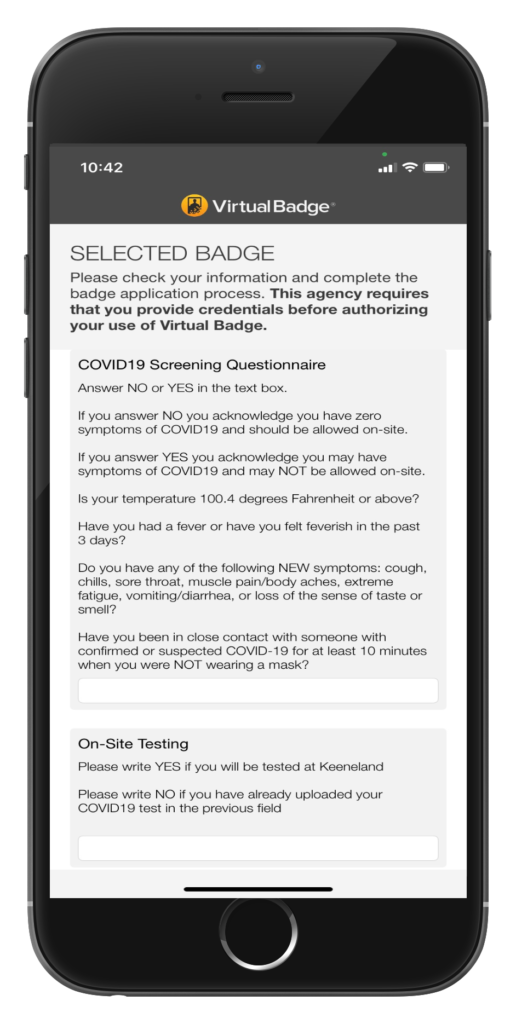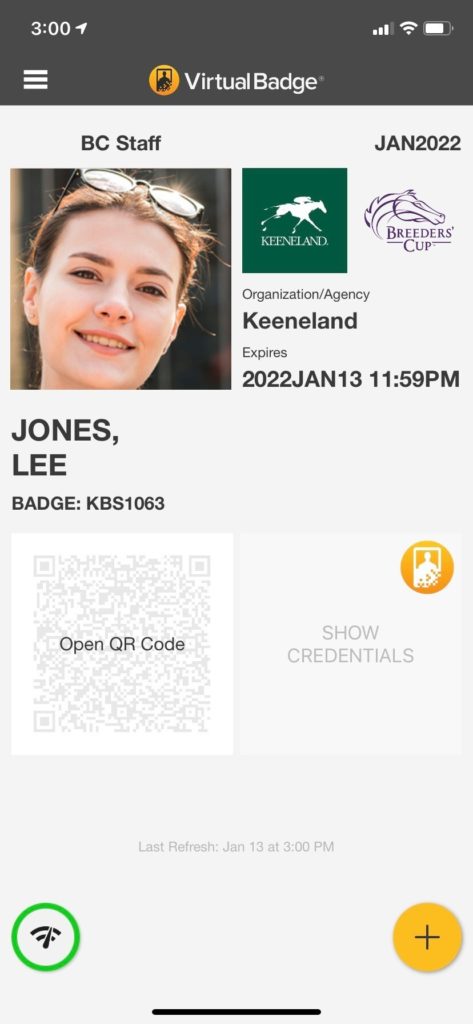By using the Virtual Badge digital identity platform, the Breeder’s Cup was able to easily protect its horse racing event from COVID-19 induced risk during its 1,600 person, 3 day event.
THE CHALLENGE
COVID-19 infections will completely put a halt to any event. Because of this, Keeneland and The Breeder’s Cup needed a way to protect their facility and the safety of all workers and attendees from COVID-19 exposure.
With plastic badges, The Breeder’s Cup didn’t have a way to collect liability waiver forms or any ability to verify if an attendee had a valid COVID-19 negative test result. Because of these limitations and due to the fact that Keeneland (a major horseracing business in Kentucky) was already a Virtual Badge client, the decision was made to use the same processes for The Breeder’s Cup.
Keeneland already requires anyone who sets foot in their facilities to follow a strict set of health and safety protocols that are supported by Virtual Badge. Attendees register themselves by downloading the Virtual Badge mobile app, choosing their affiliation with Keeneland, and then uploading required documentation & signing various waiver forms. This process has kept Keeneland safe for almost all of 2020, and it successfully worked for The Breeder’s Cup too.

THE SOLUTION
Because Virtual Badge is rapidly deployable and can issue, track, and validate badges remotely, in
minutes, The Breeder’s Cup was easily able to implement Virtual Badging for all entry checkpoints,
eventually badging more than 1,600 people over the 3 day event. The Breeder’s Cup created easy to
follow instructions which can be found here: Breeder's Cup Virtual Badge Instructions
Each attendee would receive their instructions via email from the event, which detailed how to
download the Virtual Badge app, which forms to sign, and how they were supposed to use the app.
For a Virtual Badge to be issued, The Breeder’s Cup required the attendee to state that they had no
symptoms, sign a waiver of liability, and either agree to be tested on-site, or upload a COVID-19
negative test result within 5 days of the event.
Upon arrival at the event grounds, each badge-holder would have a “PENDING” badge, which the
event organizers would “APPROVE” once the on-site COVID-19 testing confirmed a negative result.
Each issued Virtual Badge contained proof of the negative test result, which could be produced at any
time by event staff.
The Breeder’s Cup also required the use of the Virtual Badge Geofence, which automatically
checked-in/out every badge-holder once they stepped foot in the event or left. Because of the safety
Geofence, at the conclusion of The Breeder’s Cup, event organizers were able to produce a list of
everyone who attended. This information was to be used for contact tracing in the event somebody
tested positive, but due to the health and safety workflows, no attendees caught COVID-19 at the
event.
CONCLUSION
Because nobody who attended The Breeder’s Cup caught COVID-19, the usage of Virtual Badge was a total success on multiple fronts. Health and safety risk factors were mitigated due to linking Virtual Badge issuance with on-site COVID-19 testing. Legal liability risk factors were eliminated because it was impossible to get a Virtual Badge without signing a waiver of liability, attesting that each badge-holder had no COVID-19 symptoms, and all attendees were made aware of, could follow, and review on-site safety protocols on their smartphone.
For security and peace of mind, Virtual Badge greatly lessened the stress and complexity of designing and hosting the event for all security and operational staff. Rather than wondering who was there and if their paperwork was completed properly, The Breeder’s Cup staff simply had to refer to each Virtual Badge profile. At a glance, the team was able to see each attendee’s current status, if they needed to complete any documentation, and if the security team needed to communicate with them.
Due to the marketing implications of this health, safety, and risk management solution, both The Breeder’s Cup and Keeneland were able to increase positive perception from their customers and fans as well as protect their reputations as premier event providers because they were able to successfully put on an event in the middle of a pandemic.

